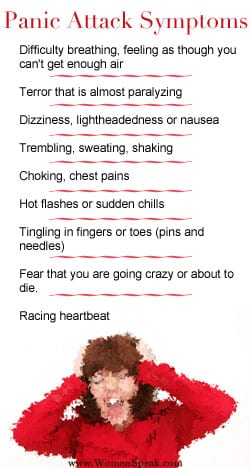A Fear You Should Be Afraid Of:
What is a Panic Attack and What Can You Do about It?
 Many people have at one time or another experienced a frightening condition called, “panic attack” or “panic disorder.” Panic attacks can interfere with the quality of time they spend with their significant others, friends and/or families.
Many people have at one time or another experienced a frightening condition called, “panic attack” or “panic disorder.” Panic attacks can interfere with the quality of time they spend with their significant others, friends and/or families.
They can also make trouble at work, which most women appreciate as a creative and energizing atmosphere.
For some however, the workplace is perceived as a pressure cooker. They find themselves overwhelmed by their duties and job responsibilities. These work stresses can add to their risk of developing panic attacks.
How does stress affect the human body?
The composition of the human body is constructed very much like a chain. A chain is composed of links that are intertwined to hold the chain together. If pulled or stretched, the chain will most likely break into pieces. It will break where the greatest pressure is exerted and where the weakest link is located. Human beings are very much like a golden chain.
The mind and the body work as a chain and interact in unison to help the individual to make sense of, understand and function in the world. If a person feels overwhelmed, this fragile chain can break!
This condition can lead to a person having panic attacks. Panic attacks affect the behavior, the body and the emotions and can paralyze the person. Panic attacks, if left un-treated, can lead to a more chronic medical condition (such as substance abuse, depression or ulcers), poor job performance and possible loss of job or family.
What is a panic attack?
|
A panic attack is an exaggerated fight or flee response. Nature has provided us all with built-in survival skills. If an individual perceives that a forthcoming attack or a life-threatening situation is at hand he/she can do one of two things. One, she may decide to stay and (fight) off her enemy. Or, she can decide it is better to run (flee) like crazy to avoid the danger. The body physically prepares the body to fight or flee. The person’s body and mind begin to form physical, psychological, and behavioral responses to this perception. Physically the body prepares the heart by pumping blood into major muscle groups of the legs and arms. This is to prepare the body for the attack. The lungs fill with oxygen and breathing increases to pump the needed blood to the body for action. The brain is problem-solving and decides where the best place is to either fight or flee. The behavior that follows is either running or fighting. Consider this: What if the perception of danger and/or threat is not real and yet the body decides that it is? This event can lead to men, women and even children to having full-blown panic attacks. If these symptoms persist, a professional may make a diagnosis of Panic Disorder. |
Sites of Interest |
What are the symptoms of a panic attack?
One in every 75 or so people is diagnosed with panic disorder. In addition, these symptoms are not warranted and there are no particular reasons or circumstances that they should be occurring (no danger exists). The attacks can occur without warning. It is also important to understand the level of fear experienced is way out of proportion to the actual situation. Often, it is completely unrelated to what the person is doing or her location. Lastly, an attack passes within a few minutes. Sometimes an attack can be repeated, some even recurring for hour at a time. A panic attack is not dangerous in itself, but to the person experiencing the attack, it is terrifying and very real. The person may describe feeling crazy or as if she is losing control. If left un-treated, panic attacks can lead to other conditions such as phobias, depression, substance abuse, medical conditions such as ulcers, and even suicide. The social impairment for a person with panic attacks can also lead to complete social withdrawal. She may try to avoid all social and physical settings that could trigger another attack. |
Related Articles
Articles of Interest |
Can panic attacks be treated?
|
Fortunately, there are effective treatments available for panic disorder. Many persons with panic attacks have seen numerous doctors seeking help. It is not unusual for people with panic attacks to believe they have a medical condition that has been missed and they have some horrible disease that is the causing the attacks. Proper diagnosis and treatments are imperative. Medical and behavioral treatments are available and very effective in the treatment of panic attacks. The good news is people with panic attacks can lead to normal, productive lives. Talented and successful people may leave jobs or relationships that are perceived as possible triggers for future attacks. An employee may be passed over for a position because travel is required and they are fearful of flying or driving a car because of past panic attacks. It is not unusual for a person with panic attacks to be embarrassed and ashamed of their condition and therefore keep it from co-workers, supervisors and friends. Often the person’s condition is hidden until a situation arises when the attacks can longer be ignored. |
 |
How can you help a friend who has panic attacks?
|
Be supportive and do not jump to conclusions. You are not a professional, so do not make a diagnosis. Leave diagnosis and treatment to the professionals. The person experiencing panic attacks cannot make them go away and it is not a sign of weakness or poor character. The attacks are very real to them and their bodies react to these fears as if they are real. Encourage the person to talk about her feelings and experiences and to seek professional assistance. Many times a person with panic attacks is afraid you will judge her or find out that she is going crazy. Many companies have an Employee Assistance Program on site or contract with a mental health organization that provides help for employees and their families. The very best assistance for people with panic attacks is to understand they are not going crazy nor will they die. Panic attacks should be taken seriously and the person seen by a qualified medical/mental health professional as soon as possible. Proper diagnosis and treatment are the keys for recovery for the person with panic attacks to enable them to lead a successful and happy life. |
 |
For more information about panic disorder and other related anxiety- related conditions, please visit your local or National Mental Health Association or the American Psychological Association. These associations will be able to get you more information about panic attacks and will also offer referrals for treatment if you ask them.


